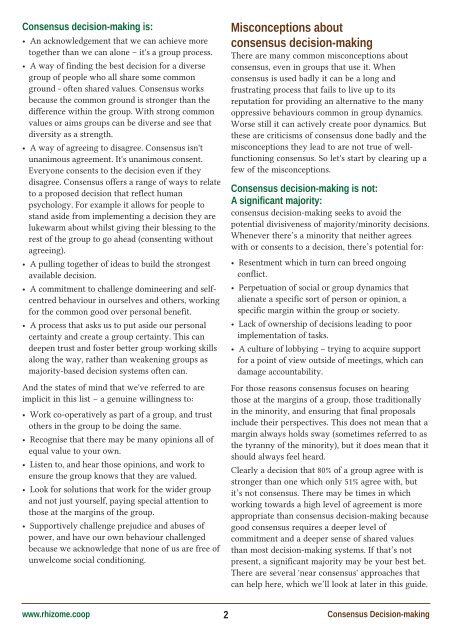Consensus Decision-making - Rhizome
Consensus Decision-making - Rhizome
Consensus Decision-making - Rhizome
You also want an ePaper? Increase the reach of your titles
YUMPU automatically turns print PDFs into web optimized ePapers that Google loves.
<strong>Consensus</strong> decision-<strong>making</strong> is:• An acknowledgement that we can achieve moretogether than we can alone – it's a group process.• A way of finding the best decision for a diversegroup of people who all share some commonground - often shared values. <strong>Consensus</strong> worksbecause the common ground is stronger than thedifference within the group. With strong commonvalues or aims groups can be diverse and see thatdiversity as a strength.• A way of agreeing to disagree. <strong>Consensus</strong> isn'tunanimous agreement. It's unanimous consent.Everyone consents to the decision even if theydisagree. <strong>Consensus</strong> offers a range of ways to relateto a proposed decision that reflect humanpsychology. For example it allows for people tostand aside from implementing a decision they arelukewarm about whilst giving their blessing to therest of the group to go ahead (consenting withoutagreeing).• A pulling together of ideas to build the strongestavailable decision.• A commitment to challenge domineering and selfcentredbehaviour in ourselves and others, workingfor the common good over personal benefit.• A process that asks us to put aside our personalcertainty and create a group certainty. This candeepen trust and foster better group working skillsalong the way, rather than weakening groups asmajority-based decision systems often can.And the states of mind that we've referred to areimplicit in this list – a genuine willingness to:• Work co-operatively as part of a group, and trustothers in the group to be doing the same.• Recognise that there may be many opinions all ofequal value to your own.• Listen to, and hear those opinions, and work toensure the group knows that they are valued.• Look for solutions that work for the wider groupand not just yourself, paying special attention tothose at the margins of the group.• Supportively challenge prejudice and abuses ofpower, and have our own behaviour challengedbecause we acknowledge that none of us are free ofunwelcome social conditioning.Misconceptions aboutconsensus decision-<strong>making</strong>There are many common misconceptions aboutconsensus, even in groups that use it. Whenconsensus is used badly it can be a long andfrustrating process that fails to live up to itsreputation for providing an alternative to the manyoppressive behaviours common in group dynamics.Worse still it can actively create poor dynamics. Butthese are criticisms of consensus done badly and themisconceptions they lead to are not true of wellfunctioningconsensus. So let's start by clearing up afew of the misconceptions.<strong>Consensus</strong> decision-<strong>making</strong> is not:A significant majority:consensus decision-<strong>making</strong> seeks to avoid thepotential divisiveness of majority/minority decisions.Whenever there’s a minority that neither agreeswith or consents to a decision, there’s potential for:• Resentment which in turn can breed ongoingconflict.• Perpetuation of social or group dynamics thatalienate a specific sort of person or opinion, aspecific margin within the group or society.• Lack of ownership of decisions leading to poorimplementation of tasks.• A culture of lobbying – trying to acquire supportfor a point of view outside of meetings, which candamage accountability.For those reasons consensus focuses on hearingthose at the margins of a group, those traditionallyin the minority, and ensuring that final proposalsinclude their perspectives. This does not mean that amargin always holds sway (sometimes referred to asthe tyranny of the minority), but it does mean that itshould always feel heard.Clearly a decision that 80% of a group agree with isstronger than one which only 51% agree with, butit’s not consensus. There may be times in whichworking towards a high level of agreement is moreappropriate than consensus decision-<strong>making</strong> becausegood consensus requires a deeper level ofcommitment and a deeper sense of shared valuesthan most decision-<strong>making</strong> systems. If that’s notpresent, a significant majority may be your best bet.There are several 'near consensus' approaches thatcan help here, which we’ll look at later in this guide.www.rhizome.coop2 <strong>Consensus</strong> <strong>Decision</strong>-<strong>making</strong>





